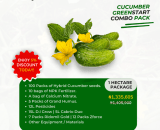Cucumber farming in Nigeria has become a profitable business venture for farmers due to the high demand for vegetables in both local and international markets. Cucumbers are widely consumed as a salad ingredient, snack, or processed into pickles, sauces, and other products. To succeed in cucumber farming in Nigeria, you need to have the right inputs and knowledge to produce high-quality crops.
Essential Inputs Required for Cucumber Farming in Nigeria
Cucumber farming in Nigeria requires several essential inputs to ensure high yield and quality produce. Here are some of the critical inputs required for successful cucumber farming:
- Seeds
The first input you will need for cucumber farming is high-quality seeds. You can purchase cucumber seeds from reputable seed companies or certified suppliers, like Farmsquare. It is essential to choose a variety that is suitable for your growing region and farming practices. You can select from a range of cucumber varieties such as Darina, Greengo, and Monalisa.
- Soil
Cucumber farming requires well-drained soils with high organic matter content. The ideal pH range for cucumber farming is between 6.0 to 7.0. You can improve your soil fertility by adding organic matter such as compost or animal manure. It is also essential to test your soil regularly to ensure it has the right nutrient balance.
- Fertilizers
Cucumbers require adequate nutrients for healthy growth and high yield. You can apply organic fertilizers such as compost or animal manure to improve soil fertility. Inorganic fertilizers such as NPK can also be applied to provide essential nutrients such as nitrogen, phosphorus, and potassium. However, it is essential to use fertilizers sparingly to prevent soil nutrient imbalances and environmental pollution.
- Irrigation
Cucumbers require sufficient water for healthy growth and high yield. You can use drip irrigation or sprinkler irrigation systems to supply water to your crops. Drip irrigation is the most efficient method as it reduces water wastage and improves soil moisture retention. It is also essential to monitor your soil moisture regularly to ensure your plants receive adequate water.
- Pesticides
Cucumber farming in Nigeria is prone to pests and diseases, which can affect crop yield and quality. You can use organic pesticides such as neem oil or botanicals to control pests and diseases. Inorganic pesticides such as insecticides and fungicides can also be applied but should be used sparingly to avoid chemical residues on crops.
Call to Action
Cucumber farming in Nigeria requires essential inputs such as high-quality seeds, suitable soil, fertilizers, irrigation, and pesticides to succeed. With the right inputs and knowledge, you can produce high-quality cucumbers that meet market demand and generate income. If you’re considering cucumber farming in Nigeria, ensure you have the right inputs and knowledge to start a successful farming business.
Take action today and invest in cucumber farming in Nigeria. With hard work and dedication, you can reap the rewards of a successful farming business.









Customer reviews
Reviews
There are no reviews yet.
Only logged in customers who have purchased this product may leave a review.